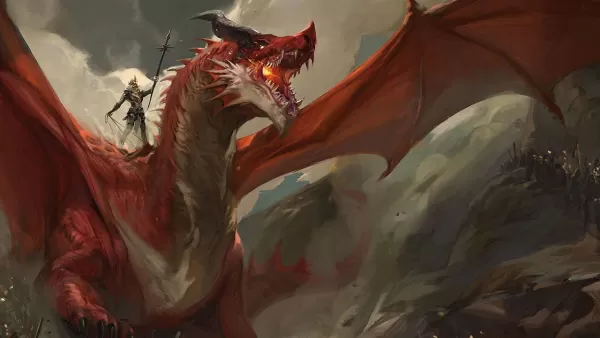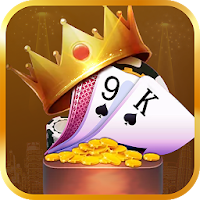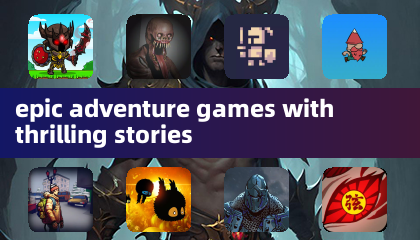Beginner's Guide to Dungeons & Dragons 2025: Start Your Adventure
Dungeons & Dragons (D&D) is a tabletop role-playing game (TTRPG) that blends collaborative storytelling with strategic gameplay, using dice rolls to shape the narrative. Fueled by the success of Dungeons & Dragons: Honor Among Thieves and Baldur's Gate 3, this iconic game, now in its 5th edition (D&D 5e) with updated rulebooks, is more accessible than ever for newcomers. It’s the perfect moment to dive into the adventure.
For a simpler alternative, many board games inspired by D&D offer a fun, beginner-friendly experience.
What You Need to Start Playing D&D
1. The Players
D&D requires at least two participants, though a group of 3-5 is ideal. At minimum, you need a Dungeon Master (DM) and one or more players. Larger groups are welcome, so invite as many friends as your space allows.
The DM guides the session, crafts adventures, interprets rules, and populates the game world with characters, locations, and challenges. While the role may seem intimidating, it’s deeply rewarding for those who love crafting epic tales. The Dungeon Master’s Guide and Monster Manual are great starting points, and pre-made adventure modules can ease you into the role.
2. Rulebooks
To embark on your D&D journey, you’ll need core rulebooks, but players only require one. Updated editions were released earlier this year.
Player’s Handbook - Essential for players, this book covers character creation, core rules, and serves as a valuable reference for all experience levels.
Dungeon Master’s Guide - A must for DMs, this guide helps you create NPCs, design cities, and build immersive adventures.
Monster Manual - Packed with creatures to challenge your players, this book brings danger and excitement to your campaigns.
Additional books expand on character options, world lore, and pre-written adventures. For a budget-friendly start, D&D Starter Sets include pre-made characters, adventures, dice, maps, and simplified rules, available in physical or digital formats for virtual tabletops.
3. Dice

D&D isn’t complete without polyhedral dice: a 4-sided (d4), 6-sided (d6), 8-sided (d8), 10-sided (d10), 12-sided (d12), and 20-sided (d20) die. Each player and the DM needs one set, but collecting more is a fun hobby for many. Explore top D&D dice sets for recommendations.
4. Character Sheets
Character sheets track your character’s stats, abilities, equipment, and key details. The Player’s Handbook includes a basic sheet, but you can find or create digital versions on platforms like DnDBeyond. Some sites, including those tied to Baldur's Gate 3, offer themed character sheets and dice sets.
5. Miniatures and Game Boards
Optional but immersive, miniatures and game boards visualize characters and combat scenes. Players and DMs often enjoy designing and painting these. For remote play, virtual tabletops (VTTs) like Roll20 or FoundryVTT replace physical components, while tools like DnDBeyond, Zoom, or Discord streamline online sessions.
Ready to Play? Here’s How
How to Play Dungeons & Dragons
Create Your Character: Each player crafts a unique character using the Player’s Handbook to assign stats, abilities, and equipment that shape their journey.Build a World: The DM creates or selects a setting, either from their imagination (homebrew) or pre-written modules, setting the stage for your adventure.
Take Turns: Players take turns describing their character’s actions, from exploring to interacting with NPCs or battling foes. The DM guides the flow, so communicate your intentions.
Roll Dice: For risky actions, the DM sets a difficulty check (DC). Roll your dice, add modifiers from your character sheet, and succeed if you meet or exceed the DC.
Combat: Combat follows a structured turn-based system where players attack or use abilities to overcome enemies.
Character Creation
Creating a character is a highlight of D&D, though it can be complex for beginners. Here’s how to start:
Choose a Race: The Player’s Handbook details races like humans, elves, or dwarves, each with unique traits. Review all options to find the best fit.Pick a Class: Your class (e.g., fighter, wizard, rogue) defines your abilities and role. Each offers distinct strengths and weaknesses.
Set Ability Scores: Roll dice to determine your character’s Strength, Dexterity, Constitution, Intelligence, Wisdom, and Charisma. Race and class may adjust these scores, and alternative methods are outlined in the Player’s Handbook.
Select Equipment: Choose starting gear like weapons and armor based on your class and background. More treasures await in your adventures.
Craft a Backstory: Define your character’s identity, origins, and personality. Collaborate with your DM to weave your backstory into the campaign.
Key Terms and Rules
D&D’s rules can feel overwhelming, but you’ll learn as you play. Refer to rulebooks for clarity, and here are some essentials:
Actions: In combat, characters can take Actions, Bonus Actions, or Reactions, like attacking, casting spells, or dodging.Initiative: Roll a d20 and add your initiative modifier to determine turn order in combat.
Hit Points: Your health (HP) decreases with damage and increases with healing. At 0 HP, your character is unconscious and risks death.
Armor Class: Your Armor Class (AC) determines how hard you are to hit. Attacks below your AC miss.
Leveling: Characters gain new abilities and stats as they level up, based on experience points (XP) or milestones set by the DM.
Tips for Great Players
Share the Spotlight: Ensure everyone gets a chance to shine in this collaborative game.Embrace Vulnerability: Role-playing can feel daunting. Start by describing your character’s actions, then try first-person dialogue or a unique voice.
Support Others: Foster a welcoming environment by encouraging fellow players and celebrating their efforts.
Tips for Dungeon Masters

Being a DM is challenging but rewarding. Here are tips to excel:
Prepare Thoroughly: Familiarity with your world’s people, places, and items helps you adapt when players surprise you.Stay Flexible: Players may derail your plans. Embrace their choices to co-create the story.
Encourage Creativity: Reward innovative solutions beyond combat.
Bend the Rules: Prioritize fun over strict adherence to rules. Use the “Rule of Cool” to allow exciting moments.
Set Expectations: Discuss the game’s tone (lighthearted or dark) with players using tools like Session 0s or Safety Tools.
Leverage Tools: Use DnDBeyond for character creation, Roll20 or FoundryVTT for virtual play, and Zoom or Discord for online sessions.
Dungeons & Dragons welcomes players from all backgrounds. With preparation and a passion for storytelling, you’re ready for an unforgettable adventure. Gather your party, roll the dice, and let the journey begin!


























